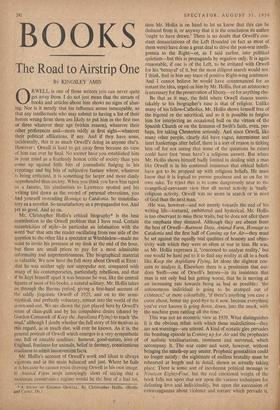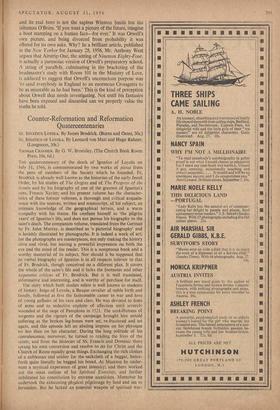BOOKS
The Road to Airstrip One
0 RWELL is one of those writers you can never. quite get away from. I do not just mean that the stream of books and articles about him shows no signs of abat- ing. Nor is it merely that his influence seems inescapable, so that any intellectuals who may submit to having a list of their heroes wrung from them are likely to put him in the first two or three whatever their age (within reason), whatever their other preferences and—more oddly at first sight—whatever their political affiliations, if any. And if they have none, incidentally, this is as much Orwell's doing as anyone else's. However : Orwell is hard to get away from because no view of him can ever be final. No sooner have you established him in your mind as a fearlessly honest critic of society than you come up against little bits of journalistic fudging in his reportage and big bits of subjective fantasy where, whatever is being criticised, it is something far larger and more dimly apprehended than society. When you think you have him taped as a fanatic, his similarities to Lawrence spotted and his writing tied down as the record of personal obsessions, you find yourself re-reading Homage to Catalonia. So unsatisfac- tory as a novelist. So unsatisfactory as a propagandist too. And yet so good. And so on. then Mr. Hollis is on hand to let us know that this can, be deduced from it, or anyway that it is the conclusion its author `ought to have drawn.' There is no doubt that Orwell's con- stant. denunciations- of the Left (founded on fact as most of them were) have done a great deal to drive the post-war intelli- gentsia to the Right—or, as I said earlier, into • political quietism—but this is propaganda by negation only. It is again reasonable, if one is of the Left, to be irritated with Orwell for his 'betrayal' of it, but the most diligent search would not, I think, find in him any trace of positive Right-wing sentiment. And I cannot believe he would have countenanced for an instant the idea, urged on him by Mr. Hollis. that an aristocracy is necessary for the preservation of liberty—or for anything else.
Be that as it may, the .field where Orwell dances unmis- takably to his biographer's tune is that of" religion. Unlike many of his fellow-Catholics, Mr. Hollis shows himself free of the bigoted or the uncritical, and so it is possible to forgive him for interjecting an occasional bull on the virtues of the Spanish Church or on the firmness of Swift's faith, even, per- haps, for taking Chesterton seriously. And since Orwell, like many other people, clearly did have vague, intermittent and inert hankerings after belief, there is a sort of reason in ticking him off for not seeing that some of the questions he raised could have (not 'must have') a religious answer. But where Mr. Hollis shows himself badly limited in dealing with a man like Orwell is in his continual insistence that ethical beliefs have got to be propped up with religious beliefs. He must know that it is logical to pursue goodness and so on for its own sake. To reject this is to come dangerously near to the evangelical-canvasser view that all moral activity is 'really' religious activity. Orwell was no more in search or in need of God than the next man.
'He was, however—and not merely towards the end of his writing life—tortured, embittered and hysterical. Mr. Hollis is too observant to miss these traits, but he does not allot them the emphasis they demand. Although they are absent from the best of Orwell—Burmese Days, Animal Farm, Homage to Catalonia and the first half of Coming up for Air—they must be set against the equally real qualities of honesty and objec- tivity with which they were so often at war in him. He was. as Mr. Hollis expresses it, 'concerned to analyse reality,' but one would be hard put to it to find any reality at all in a book like Keep the Aspidistra Flying, let alone the slightest con- cern to analyse it. Elsewhere there is a pessimism that out- does Swift—one of Orwell's heroes—in its insistence that man is not only bad but getting worse, that he is moving at an increasing rate towards being as bad as possible : 'the autonomous individual is going to be stamped out of existence,' or more colourfully, 'if there's anything you care a curse about, better say good-bye to it now, because everything you've ever known is going down, down, into the muck, with the machine guns rattling all the time.'
This was not an eccentric view in 1939. What distinguishes it is the obvious relish with which these maledictions—they are not warnings—are uttered. A kind of ecstatic glee pervades the bombing episode in Coming up for Air and the prophecies of sadistic totalitarianism, imminent -and universal, which accompany it. The war came' and went, however, without bringing the smash-up any nearer. Prophetic generalities could no longer satisfy : the nightmare of endless brutality must be rehearsed at length and in detail, shown as actually taking place. There is some sort of incoherent political message in Nineteen Eighty-Four, but, the real emotional weight of the book falls not upon that nor upon the various techniques for defeating love and individuality, but upon the succession of extravanganzas about violence and torture' which pervade it, and its real hero is not the sapless Winston Smith but the inhuman O'Brien. 'If you want a picture of the future, imagine a boot stamping on a human face—for ever.' It was Orwell's own picture, and being divorced from probability it was offered for its own sake. Why? In a brilliant article, published in the New Yorker for January 28, 1956, Mr. Anthony West argues that Airstrip One, the setting of Nineteen Eighty-Four, is actually a paranoiac version of Orwell's preparatory school,. A string of parallels, culminating in the bracketing of the headmaster's study with Room 101 in the Ministry of Love, is adduced to suggest that Orwell's unconscious purpose was 'to send everybody in England to an enormous Crossgates to be as iniserable as he had been.' This is the kind of perception about Orwell that needs investigating. Not until his fantasies have been exposed and discarded can we properly value the truths he told.



































 Previous page
Previous page